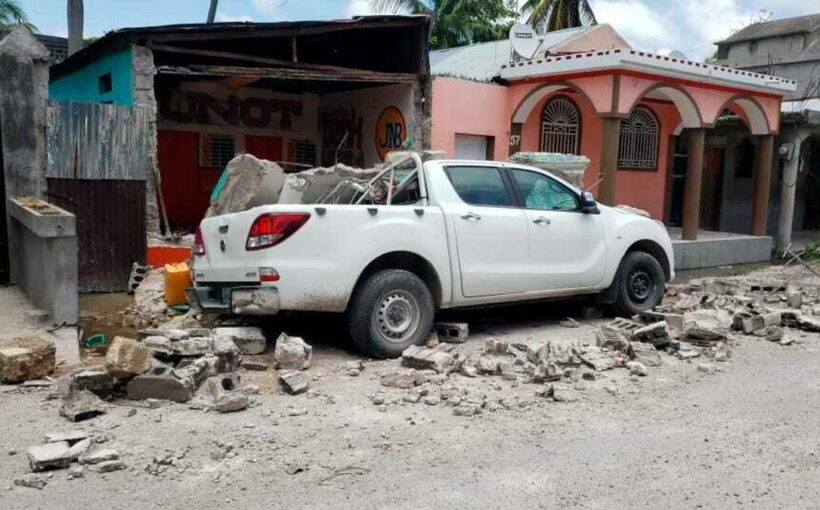At least 227 people were killed when a 7.2 magnitude earthquake struck Haiti yesterday, and Prime Minister Ariel Henry said he was rushing aid to affected areas, where some towns were destroyed and hospitals were overwhelmed with wounded people.
The epicentre of the quake was about 125 kilometres west of the capital of Port-au-Prince, the US Geological Survey (USGS) said, and widespread damage was reported.
Civil defence officials said the death toll rose to 227 yesterday afternoon. Hundreds arewounded or still missing.
Jerry Chandler, Haiti’s director of civil protection declared a one-month state of emergency for the whole country and said he would not ask for international help until the extent of the damage is known. He said some towns were almost completely razed and the Government had people in the coastal town of Les Cayes to help plan and coordinate the response.
“The most important thing is to recover as many survivors as possible under the rubble,” he said. “We have learned that the local hospitals, in particular that of Les Cayes, are overwhelmed with wounded, fractured people.”
The USGS earlier warned that the earthquake could result in thousands of fatalities and injuries. It also said at least six aftershocks had been felt in the region including one measuring 5.1 magnitude.
He said the International Red Cross and hospitals in unaffected areas were helping to care for the injured, and appealed to Haitians for unity.
“The needs are enormous. We must take care of the injured and fractured, but also provide food, aid, temporary shelter and psychological support,” he said.
US President Joe Biden and Vice President Kamala Harris received a briefing yesterday morning about the Haiti earthquake, according to the White House. Biden authorised an immediate response and named USAID administrator Samantha Power as the senior official coordinating the effort.
Humanitarian workers said information about deaths and damage was slow coming to the capital because of spotty Internet service. Also complicating relief efforts was gang activity in the seaside district of Martissant, just west of the Haitian capital.
“Nobody can travel through the area,” Ndiaga Seck, a Unicef spokesman in Port-au-Prince, said by phone. “We can only fly over or take another route.”
Seck said Unicef planned to send medical supplies to two hospitals in the south — in Les Cayes and Jeremie.
Haiti is struggling with the coronavirus pandemic and a lack of resources to deal with it. Just last month, the country of 11 million people received its first batch of US-donated coronavirus vaccines, via a United Nations programme for low-income countries.
Videos posted to social media showed collapsed buildings near the epicentre and people running into the streets.
People in Port-au-Prince felt the tremor and many rushed into the streets in fear, although there did not appear to be damage there.
Naomi Verneus, 34, a resident of Port-au-Prince, said she was jolted awake by the earthquake and that her bed was shaking.
“I woke up and didn’t have time to put my shoes on. We lived the 2010 earthquake and all I could do was run. I later remembered my two kids and my mother were still inside. My neighbour went in and told them to get out. We ran to the street,” Verneus said.
Paul Caruso, a geophysicist with the USGS, said aftershocks likely will continue for weeks or months, with the largest so far registering a magnitude 5.2.
The impoverished country, where many live in tenuous circumstances, is vulnerable to earthquakes and hurricanes. It was struck by a magnitude 5.9 earthquake in 2018 that killed more than a dozen people, and a vastly larger magnitude 7.1 quake that damaged much of the capital in 2010 and killed an estimated 300,000 people.
The National Hurricane Centre has forecasted that Tropical Storm Grace will reach Haiti late Monday night or early Tuesday morning.
The earthquake struck more than a month after President Jovenel Moise was killed, sending the country into political chaos, and humanitarian aid groups said the earthquake will add to the suffering.
“We’re concerned that this earthquake is just one more crisis on top of what the country is already facing – including the worsening political stalemate after the president’s assassination, Covid and food insecurity,” said Jean-Wickens Merone, spokesman for World Vision Haiti.
Catholic priest Fredy Elie, who began working with the Mission in Haiti Congregation after the 2010 earthquake, told the Associated Press that access to the area is hindered by criminal gangs and was pleading for help.
“It’s time to open the road to those who want to help. They need help from all of us,” Elie said.
– AP
Source: Read Full Article

/cloudfront-ap-southeast-2.images.arcpublishing.com/nzme/5QIXVYFXAXAAXN74FN7ESOP23E.jpg)